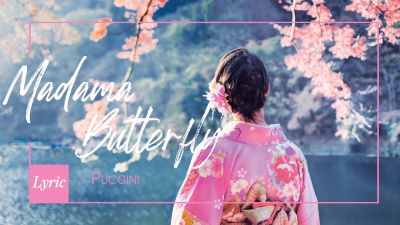
 Highly Recommended **** It’s hard to think of a classical opera that still elicits stronger reactions than Giacomo Puccini’s Madama Butterfly. As the story of a woman who attempts to escape the strictures of her own society by marrying into another and being betrayed a second time, it poses uncomfortable questions about identity and loyalty. And while it contains some of Puccini’s best-beloved arias, large portions of Giuseppe Giacosa and Luigi Illica’s libretto are too conversational for a viewer to lose themselves in musical grandeur. Audiences will have to draw their own conclusions, but the Lyric Opera’s revival of a production originally directed by Michael Grandage lays out the questions in their full complexity, and Henrik Nánási’s conducting buttresses their emotional heft.
Highly Recommended **** It’s hard to think of a classical opera that still elicits stronger reactions than Giacomo Puccini’s Madama Butterfly. As the story of a woman who attempts to escape the strictures of her own society by marrying into another and being betrayed a second time, it poses uncomfortable questions about identity and loyalty. And while it contains some of Puccini’s best-beloved arias, large portions of Giuseppe Giacosa and Luigi Illica’s libretto are too conversational for a viewer to lose themselves in musical grandeur. Audiences will have to draw their own conclusions, but the Lyric Opera’s revival of a production originally directed by Michael Grandage lays out the questions in their full complexity, and Henrik Nánási’s conducting buttresses their emotional heft.
The play opens in early twentieth century Nagasaki. American Lieutenant Benjamin Franklin Pinkerton (Brian Jagde, Brandon Jovanovich on March 4 and 7) is learning how to use sliding doors and collapsible walls. He finds them pleasing and is even more delighted by his Japanese servants’ awkward and transparent flattery. But the best thing about this country, he proclaims, is getting to marry a teenager on a month-to-month basis. His bride, Cio-Cio-San (Ana María Martínez, Lianna Haroutounian March 4 and 7) candidly agrees that this arrangement is pulling her out of a life as a geisha, which she was reduced to after a typhoon destroyed her noble family’s estate. But she approaches the marriage from the opposite angle, hoping that it will open up new ideas and better legal protections to her. The wedding goes sour when Cio-Cio-San’s family discovers she has converted to Christianity, which they didn’t think was the arrangement, and when Pinkerton takes his leave, she agrees to wait for him. And wait. And wait. And give birth to their son and wait. Until Pinkerton’s embarrassed that she’s still waiting when he comes back.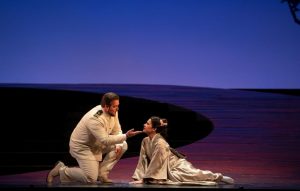
In Martínez’s program note, she says she sees Cio-Cio-San’s pride as key to her character. Her performance is quite contained; a dignified lady who commits to her own careful decisions about what is valuable. Cio-Cio-San is a controversial figure. On one hand, critics of the opera point out that her end is convenient for the white characters, but on the other, her choices are very similar to dozens of other self-disposing women in opera who get praised for their strength and whose motives aren’t as well explicated. Martínez’s rendition of the famous aria Un bel dì vedremo, about Cio-Cio-San’s fantasy of her reunion with Pinkerton, is lovely. But it’s also grounded and stately, as though its value to Cio-Cio-San is the happiness it’s providing to her in the present and not just as a hope for the future. Much more urgent is Ah! M’ha scordata?, her outraged contemplation of returning to her old life even more an outcast than before, and for me, this was the core of the show and the section that could be more accurately called “powerful.”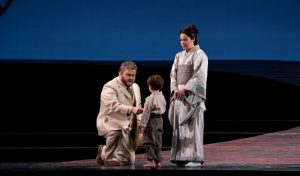
At the performance I saw, several of the secondary roles were played by stand-ins or were swapped due to illness. That’s unfortunately common during Chicago Februarys, but Grandage and revival director Louisa Miller’s staging is designed to center Cio-Cio-San and she remained the anchor. Christopher Oram’s set and costume designs are beautiful in their simplicity and cleverly merge Italian style internal proscenium arches with Japanese style paintings. Nánási’s conducting appropriately allows the story and acting to take precedence, but it does provide a tense climax as well as a meditative mood to Cio-Cio-San’s long night of waiting between the second and third acts. That the main character is played by actresses who are much older than fifteen perhaps distorts the power dynamics that are described in the text, and since the show opens with something as mundane as a description of internal decor, it does seem that we’re supposed to be interpreting the story realistically. But personally, I find a story about a person’s internal culture clash fascinating and am glad this production made a tragedy, for all its beauty, feel uncomfortable.
Madama Butterfly will continue at the Lyric Opera House, 20 N Upper Wacker Drive, Chicago, thru March 8, with the following showtimes: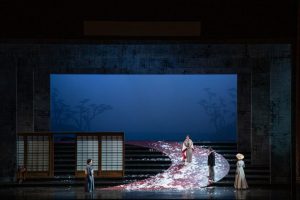
February 14: 7:00 pm
February 17: 7:00 pm
February 21: 7:00 pm
February 24: 7:00 pm
February 29: 7:30 pm
March 4: 2:00 pm
March 5: 2:00 pm
March 7: 7:30 pm
March 8: 2:00 pm
Running time is three hours with one intermission.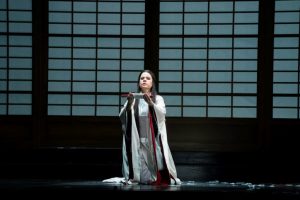
Performances are in Italian with English supertitles.
The Lyric offers parking deals with Poetry Garage at 201 W Madison St. if inquired about in advance. Tickets start at $49; to order, visit LyricOpera.org or call 321-827-5600.
To see what others are saying, visit www.theatreinchicago.com, go to Review Round-Up and click at “Madama Butterfly.”






More Stories
” Diary of a Black Illusionist: Walter King Jr.”/ Chicago Magic Lounge reviewed by Paul Lisnek
“Survivors” reviewed by Julia W. Rath
“Prayer for the French Republic” reviewed by Julia W. Rath ( and another by Paul Lisnek)